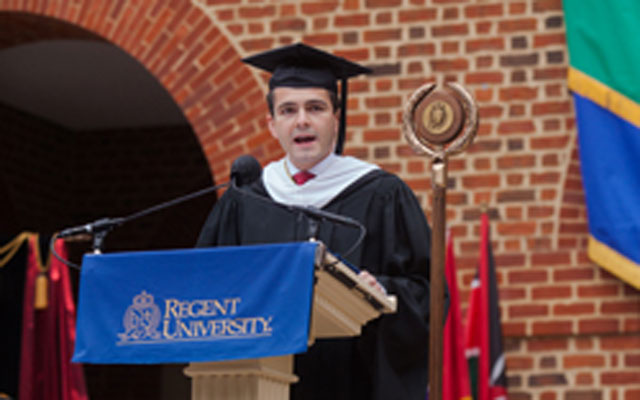Photo by Alex Perry
Hold a sense of personal responsibility over a sense of entitlement, Heritage scholar Ryan T. Anderson urged graduates on May 4 during the commencement address at Regent University. In a speech titled “Truth, Responsibility and Love,” Anderson exhorted the class of 2013 to consider their responsibilities in a world preoccupied by spurious “rights.”
“You will hear some claim a right to do whatever they want, provided it doesn’t harm others, by which they mean others who can complain about it. Notice where this leaves the vulnerable, the marginalized and the unborn,” Anderson said, alluding to the murder trial of Philadelphia abortionist Kermit Gosnell.
“You will hear others claim a right to fulfill their desires without consequence, without judgment, but with subsidies. Just think of ‘The Life of Julia,’” he added, referring to the online slide show last year saluting the swelling nanny state under President Obama. “What if, in addition to rights, we thought of the other R-word: responsibilities? What if we spoke of duties and obligations?”
In a rare honor for someone of Anderson’s age (31), Heritage’s William E. Simon Fellow in Religion and a Free Society was asked to speak at the Christian college in Virginia Beach in recognition of his work on marriage, religious liberty, bioethics, and life.
Anderson pointed the Regent graduates to the importance of inter-generational responsibilities within the family—parents for their children, but also children for their aging parents:
And as mothers and fathers you have the responsibility to care for and educate your children. Government should empower you to fulfill those duties. It shouldn’t interfere or indoctrinate. Nor should it use health care laws or anti-bullying programs to promote a sexual ideology at odds with the values that responsible parents try to instill in their children.
Too many of us think it’s the government’s job to care for our aging parents and grandparents. But when Scripture speaks of honoring your mother and father, it doesn’t only mean behaving yourself when you’re a kid. It also means caring for your parents as they age. Whenever possible, inviting them into your homes, rather than sending them to a nursing home. Viewing them as your responsibility, not just Social Security’s.
He went on to make a moral case for capitalism:
We know that the market economy—along with families headed by married couples—has done more to lift people out of poverty and into a flourishing life than any other institution. But it only works if people of good character and upright morals are at the helm. Markets are inert apart from the values that actors bring to them—and you have responsibility for your market action.
And Anderson urged the Regent grads to serve the poor—not through ever-growing government programs, but as individuals participating in churches, charities, and other institutions of civil society:
People experience hard times, and your obligations to your neighbors won’t stop in the boardroom or at the storefront.…Long before the nation-state existed, Christians were caring for the sick, the widowed and the orphaned.…Who among the graduating class of Regent University will start a shelter with job-training programs? Who will open a health care clinic in our inner cities?
To read the entire address go here; to see a video, go here (beginning at 42:30).
Source material can be found at this site.










